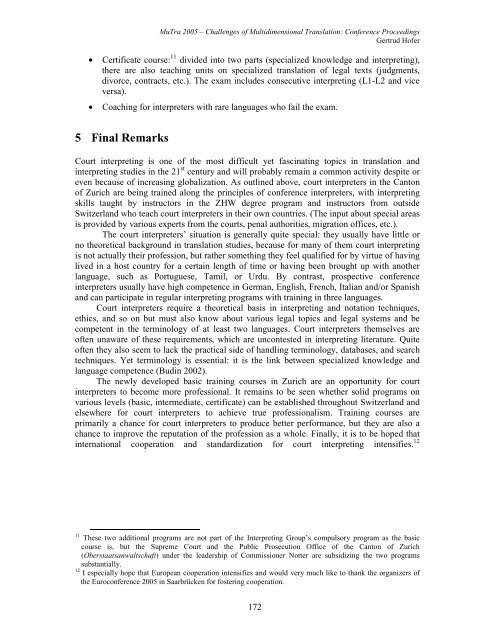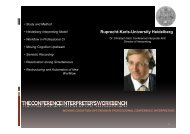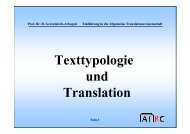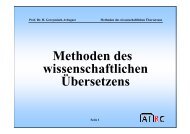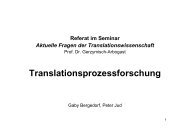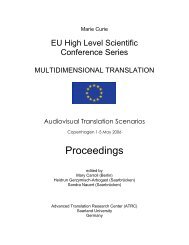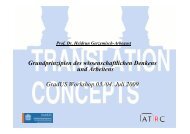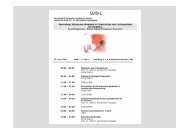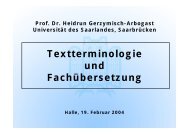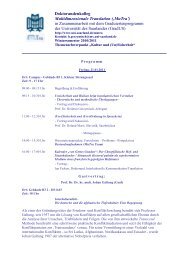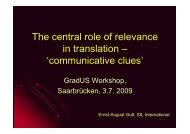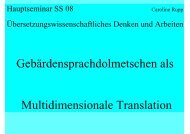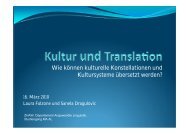Proceedings - Translation Concepts
Proceedings - Translation Concepts
Proceedings - Translation Concepts
You also want an ePaper? Increase the reach of your titles
YUMPU automatically turns print PDFs into web optimized ePapers that Google loves.
MuTra 2005 – Challenges of Multidimensional <strong>Translation</strong>: Conference <strong>Proceedings</strong><br />
Gertrud Hofer<br />
• Certificate course: 11 divided into two parts (specialized knowledge and interpreting),<br />
there are also teaching units on specialized translation of legal texts (judgments,<br />
divorce, contracts, etc.). The exam includes consecutive interpreting (L1-L2 and vice<br />
versa).<br />
• Coaching for interpreters with rare languages who fail the exam.<br />
5 Final Remarks<br />
Court interpreting is one of the most difficult yet fascinating topics in translation and<br />
interpreting studies in the 21 st century and will probably remain a common activity despite or<br />
even because of increasing globalization. As outlined above, court interpreters in the Canton<br />
of Zurich are being trained along the principles of conference interpreters, with interpreting<br />
skills taught by instructors in the ZHW degree program and instructors from outside<br />
Switzerland who teach court interpreters in their own countries. (The input about special areas<br />
is provided by various experts from the courts, penal authorities, migration offices, etc.).<br />
The court interpreters’ situation is generally quite special: they usually have little or<br />
no theoretical background in translation studies, because for many of them court interpreting<br />
is not actually their profession, but rather something they feel qualified for by virtue of having<br />
lived in a host country for a certain length of time or having been brought up with another<br />
language, such as Portuguese, Tamil, or Urdu. By contrast, prospective conference<br />
interpreters usually have high competence in German, English, French, Italian and/or Spanish<br />
and can participate in regular interpreting programs with training in three languages.<br />
Court interpreters require a theoretical basis in interpreting and notation techniques,<br />
ethics, and so on but must also know about various legal topics and legal systems and be<br />
competent in the terminology of at least two languages. Court interpreters themselves are<br />
often unaware of these requirements, which are uncontested in interpreting literature. Quite<br />
often they also seem to lack the practical side of handling terminology, databases, and search<br />
techniques. Yet terminology is essential: it is the link between specialized knowledge and<br />
language competence (Budin 2002).<br />
The newly developed basic training courses in Zurich are an opportunity for court<br />
interpreters to become more professional. It remains to be seen whether solid programs on<br />
various levels (basic, intermediate, certificate) can be established throughout Switzerland and<br />
elsewhere for court interpreters to achieve true professionalism. Training courses are<br />
primarily a chance for court interpreters to produce better performance, but they are also a<br />
chance to improve the reputation of the profession as a whole. Finally, it is to be hoped that<br />
international cooperation and standardization for court interpreting intensifies. 12<br />
11 These two additional programs are not part of the Interpreting Group’s compulsory program as the basic<br />
course is, but the Supreme Court and the Public Prosecution Office of the Canton of Zurich<br />
(Oberstaatsanwaltschaft) under the leadership of Commissioner Notter are subsidizing the two programs<br />
substantially.<br />
12 I especially hope that European cooperation intensifies and would very much like to thank the organizers of<br />
the Euroconference 2005 in Saarbrücken for fostering cooperation.<br />
172


